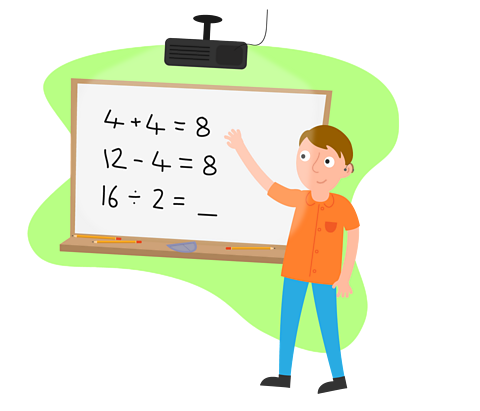Knowing numbers and counting in Spanish is a really useful skill. In this section, you can learn more about numbers and numeracy in Spanish.
The 1-2-3 challenge
Join Scottish pupils as they give Spanish a go!
Listen and guess what they are saying before trying yourself.
BOY 1: Uno łľĂˇ˛ő uno es igual a dos.
BOY 2: Cinco menos uno es igual a cuatro.
BOY 3: Diez dividido por dos es igual a cinco.
Tip: This video can be used as an interactive introduction to this topic or as a recap on key vocabulary and phrases already learnt.
Remember!
It doesn't matter if your pronunciation isn't perfect. Try your best and have fun!
Numbers 1 - 20
| Number | Spanish | Number | Spanish |
|---|---|---|---|
| 1 | Sorry, something went wrongCheck your connection, refresh the page and try again. | 11 | Sorry, something went wrongCheck your connection, refresh the page and try again. |
| 2 | Sorry, something went wrongCheck your connection, refresh the page and try again. | 12 | Sorry, something went wrongCheck your connection, refresh the page and try again. |
| 3 | Sorry, something went wrongCheck your connection, refresh the page and try again. | 13 | Sorry, something went wrongCheck your connection, refresh the page and try again. |
| 4 | Sorry, something went wrongCheck your connection, refresh the page and try again. | 14 | Sorry, something went wrongCheck your connection, refresh the page and try again. |
| 5 | Sorry, something went wrongCheck your connection, refresh the page and try again. | 15 | Sorry, something went wrongCheck your connection, refresh the page and try again. |
| 6 | Sorry, something went wrongCheck your connection, refresh the page and try again. | 16 | Sorry, something went wrongCheck your connection, refresh the page and try again. |
| 7 | Sorry, something went wrongCheck your connection, refresh the page and try again. | 17 | Sorry, something went wrongCheck your connection, refresh the page and try again. |
| 8 | Sorry, something went wrongCheck your connection, refresh the page and try again. | 18 | Sorry, something went wrongCheck your connection, refresh the page and try again. |
| 9 | Sorry, something went wrongCheck your connection, refresh the page and try again. | 19 | Sorry, something went wrongCheck your connection, refresh the page and try again. |
| 10 | Sorry, something went wrongCheck your connection, refresh the page and try again. | 20 | Sorry, something went wrongCheck your connection, refresh the page and try again. |
Numbers 20 - 30
| Number | Spanish |
|---|---|
| 20 | Sorry, something went wrongCheck your connection, refresh the page and try again. |
| 21 | Sorry, something went wrongCheck your connection, refresh the page and try again. |
| 22 | Sorry, something went wrongCheck your connection, refresh the page and try again. |
| 23 | Sorry, something went wrongCheck your connection, refresh the page and try again. |
| 24 | Sorry, something went wrongCheck your connection, refresh the page and try again. |
| 25 | Sorry, something went wrongCheck your connection, refresh the page and try again. |
| 26 | Sorry, something went wrongCheck your connection, refresh the page and try again. |
| 27 | Sorry, something went wrongCheck your connection, refresh the page and try again. |
| 28 | Sorry, something went wrongCheck your connection, refresh the page and try again. |
| 29 | Sorry, something went wrongCheck your connection, refresh the page and try again. |
| 30 | Sorry, something went wrongCheck your connection, refresh the page and try again. |
Numbers 30 to 50
| Number | Spanish |
|---|---|
| 30 | Sorry, something went wrongCheck your connection, refresh the page and try again. |
| 31 | Sorry, something went wrongCheck your connection, refresh the page and try again. |
| 32 | Sorry, something went wrongCheck your connection, refresh the page and try again. |
| 33 | Sorry, something went wrongCheck your connection, refresh the page and try again. |
| 34 | Sorry, something went wrongCheck your connection, refresh the page and try again. |
| 35 | Sorry, something went wrongCheck your connection, refresh the page and try again. |
| 36 | Sorry, something went wrongCheck your connection, refresh the page and try again. |
| 37 | Sorry, something went wrongCheck your connection, refresh the page and try again. |
| 38 | Sorry, something went wrongCheck your connection, refresh the page and try again. |
| 39 | Sorry, something went wrongCheck your connection, refresh the page and try again. |
| 40 | Sorry, something went wrongCheck your connection, refresh the page and try again. |
| 41 | Sorry, something went wrongCheck your connection, refresh the page and try again. |
| 42 | Sorry, something went wrongCheck your connection, refresh the page and try again. |
| 43 | Sorry, something went wrongCheck your connection, refresh the page and try again. |
| 44 | Sorry, something went wrongCheck your connection, refresh the page and try again. |
| 45 | Sorry, something went wrongCheck your connection, refresh the page and try again. |
| 46 | Sorry, something went wrongCheck your connection, refresh the page and try again. |
| 47 | Sorry, something went wrongCheck your connection, refresh the page and try again. |
| 48 | Sorry, something went wrongCheck your connection, refresh the page and try again. |
| 49 | Sorry, something went wrongCheck your connection, refresh the page and try again. |
| 50 | Sorry, something went wrongCheck your connection, refresh the page and try again. |
Numbers 50 to 100
| Number | Spanish |
|---|---|
| 50 | Sorry, something went wrongCheck your connection, refresh the page and try again. |
| 51 | Sorry, something went wrongCheck your connection, refresh the page and try again. |
| 52 | Sorry, something went wrongCheck your connection, refresh the page and try again. |
| 53 | Sorry, something went wrongCheck your connection, refresh the page and try again. |
| 60 | Sorry, something went wrongCheck your connection, refresh the page and try again. |
| 61 | Sorry, something went wrongCheck your connection, refresh the page and try again. |
| 62 | Sorry, something went wrongCheck your connection, refresh the page and try again. |
| 63 | Sorry, something went wrongCheck your connection, refresh the page and try again. |
| 70 | Sorry, something went wrongCheck your connection, refresh the page and try again. |
| 71 | Sorry, something went wrongCheck your connection, refresh the page and try again. |
| 72 | Sorry, something went wrongCheck your connection, refresh the page and try again. |
| 73 | Sorry, something went wrongCheck your connection, refresh the page and try again. |
| 80 | Sorry, something went wrongCheck your connection, refresh the page and try again. |
| 81 | Sorry, something went wrongCheck your connection, refresh the page and try again. |
| 82 | Sorry, something went wrongCheck your connection, refresh the page and try again. |
| 83 | Sorry, something went wrongCheck your connection, refresh the page and try again. |
| 90 | Sorry, something went wrongCheck your connection, refresh the page and try again. |
| 91 | Sorry, something went wrongCheck your connection, refresh the page and try again. |
| 92 | Sorry, something went wrongCheck your connection, refresh the page and try again. |
| 93 | Sorry, something went wrongCheck your connection, refresh the page and try again. |
| 100 | Sorry, something went wrongCheck your connection, refresh the page and try again. |
Talking about age

'I am … years old'
In Spanish you use the verb 'to have' (Sorry, something went wrongCheck your connection, refresh the page and try again.) to say how old you are.
Sorry, something went wrongCheck your connection, refresh the page and try again. - I am… years old
(This literally means 'I have… years')

- Sorry, something went wrongCheck your connection, refresh the page and try again. - I am seven years old
- Sorry, something went wrongCheck your connection, refresh the page and try again. - I am eight years old
- Sorry, something went wrongCheck your connection, refresh the page and try again. - I am nine years old
- Sorry, something went wrongCheck your connection, refresh the page and try again. - I am ten years old
- Sorry, something went wrongCheck your connection, refresh the page and try again. - I am eleven years old
Calculations
Once you’ve learned how to count in Spanish, you can extend your knowledge and skills by trying out some simple calculations!
| Spanish | English |
|---|---|
| Sorry, something went wrongCheck your connection, refresh the page and try again. | plus |
| Sorry, something went wrongCheck your connection, refresh the page and try again. | minus |
| Sorry, something went wrongCheck your connection, refresh the page and try again. | multiplied by |
| Sorry, something went wrongCheck your connection, refresh the page and try again. | divided by |
| Sorry, something went wrongCheck your connection, refresh the page and try again. | equals |

- Sorry, something went wrongCheck your connection, refresh the page and try again. - 4 + 4 = 8 ( four plus four equals eight )
- Sorry, something went wrongCheck your connection, refresh the page and try again. - 12 - 4 = 8 ( twelve minus four equals eight )
- Sorry, something went wrongCheck your connection, refresh the page and try again. - 16 \(\div\) 2 = 8 (sixteen divided by two equals eight )
- Sorry, something went wrongCheck your connection, refresh the page and try again. - 4 \(\times\) 2 = 8 (four multiplied by two equals eight )
How would you say these calculations in Spanish?
1 + 1 = 2
Sorry, something went wrongCheck your connection, refresh the page and try again.
5 - 1 = 4
Sorry, something went wrongCheck your connection, refresh the page and try again.
10 \(\div\) 2 = 5
Sorry, something went wrongCheck your connection, refresh the page and try again.
Ordinal numbers

Ordinal numbers are how we say 1st, 2nd, 3rd etc.
- Sorry, something went wrongCheck your connection, refresh the page and try again. - the 1st
- Sorry, something went wrongCheck your connection, refresh the page and try again. - the 2nd
- Sorry, something went wrongCheck your connection, refresh the page and try again. - the 3rd
- Sorry, something went wrongCheck your connection, refresh the page and try again. - the 4th
- Sorry, something went wrongCheck your connection, refresh the page and try again. - the 5th
Tip: The only one of these we use for dates in Spanish is Sorry, something went wrongCheck your connection, refresh the page and try again. ('the 1st').
Example:
- Sorry, something went wrongCheck your connection, refresh the page and try again. = The 1st of May
Other dates just use cardinal numbers (2, 12, 23 etc)
Examples:
- Sorry, something went wrongCheck your connection, refresh the page and try again. = The 2nd of December
- Sorry, something went wrongCheck your connection, refresh the page and try again. = The 12th of August

More on Talking topics
Find out more by working through a topic
- count7 of 11

- count8 of 11

- count9 of 11

- count10 of 11
